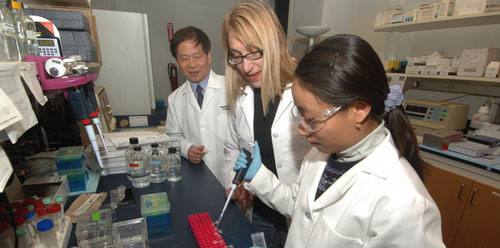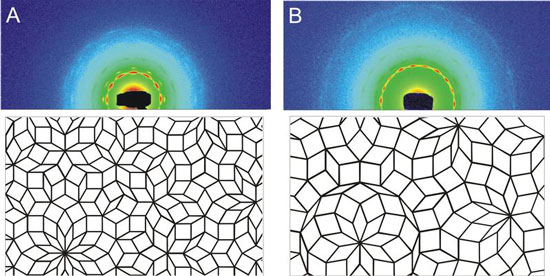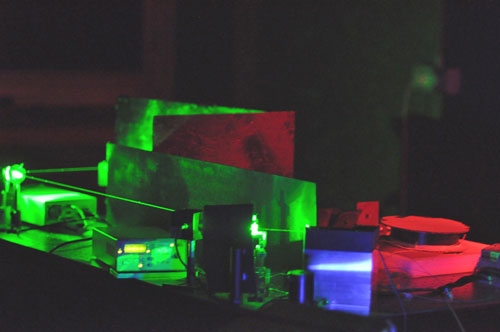Insect eyes inspire improved solar cells
Anti-reflective film based on moth eyes increases efficiency of photovoltaics.
Jan 20th, 2011
Read more
Anti-reflective film based on moth eyes increases efficiency of photovoltaics.
Jan 20th, 2011
Read more For years, RNA has seemed an elusive tool in nanotechnology research - easily manipulated into a variety of structures, yet susceptible to quick destruction when confronted with a commonly found enzyme. By replacing a chemical group in the macromolecule, researchers have found a way to bypass RNase and create stable three-dimensional configurations of RNA, greatly expanding the possibilities for RNA in nanotechnology.
For years, RNA has seemed an elusive tool in nanotechnology research - easily manipulated into a variety of structures, yet susceptible to quick destruction when confronted with a commonly found enzyme. By replacing a chemical group in the macromolecule, researchers have found a way to bypass RNase and create stable three-dimensional configurations of RNA, greatly expanding the possibilities for RNA in nanotechnology.
Jan 20th, 2011
Read more An international research group has discovered colloidal quasi-crystals for the first time. In contrast to the quasi-crystals previously documented, which can only be produced under special laboratory conditions, they are simply structured polymers that evolve through self-assembly. Due to their structural characteristics, they will probably be used in the development of innovative devices in photonics.
An international research group has discovered colloidal quasi-crystals for the first time. In contrast to the quasi-crystals previously documented, which can only be produced under special laboratory conditions, they are simply structured polymers that evolve through self-assembly. Due to their structural characteristics, they will probably be used in the development of innovative devices in photonics.
Jan 20th, 2011
Read moreA new paper from the CRO Forum explores key areas and the opportunity for collaboration in the nanotechnology area for the insurance industry.
Jan 20th, 2011
Read more Scientists from Oxford University have made a significant step towards an ultrafast quantum computer by successfully generating 10 billion bits of quantum entanglement in silicon for the first time - entanglement is the key ingredient that promises to make quantum computers far more powerful than conventional computing devices.
Scientists from Oxford University have made a significant step towards an ultrafast quantum computer by successfully generating 10 billion bits of quantum entanglement in silicon for the first time - entanglement is the key ingredient that promises to make quantum computers far more powerful than conventional computing devices.
Jan 20th, 2011
Read more The quantum computers of tomorrow might use photons, or particles of light, to move around the data they need to make calculations, but photons are tricky to work with. Two new papers by researchers working at the National Institute of Standards and Technology (NIST) have brought science closer to creating reliable sources of photons for these long-heralded devices.
The quantum computers of tomorrow might use photons, or particles of light, to move around the data they need to make calculations, but photons are tricky to work with. Two new papers by researchers working at the National Institute of Standards and Technology (NIST) have brought science closer to creating reliable sources of photons for these long-heralded devices.
Jan 20th, 2011
Read moreResearchers have shown that atomic-scale surface roughness has a strong influence on adhesion for diamond, amorphous carbon, and model diamond nanocomposites.
Jan 20th, 2011
Read moreElectronics researchers love graphene. But creating graphene-based devices will be challenging, say researchers at the National Institute of Standards and Technology (NIST), because new measurements show that layering graphene on a substrate transforms its bustling speedway into steep hills and valleys that make it harder for electrons to get around.
Jan 20th, 2011
Read moreThe secrets behind the mysterious nano-sized electromagnetic 'hotspots' that appear on metal surfaces under a light are finally being revealed with the help of a BEAST. Researchers at the Berkeley Lab have developed a single molecule imaging technology, dubbed the Brownian Emitter Adsorption Super-resolution Technique (BEAST), that has made it possible for the first time to directly measure the electromagnetic field inside a hotspot.
Jan 19th, 2011
Read more University of Illinois materials scientists have developed a simple, generalizable technique to fabricate complex structures that assemble themselves. The team demonstrated that they can produce a large, complex structure - an intricate lattice - from tiny colloidal particles called triblock Janus spheres.
University of Illinois materials scientists have developed a simple, generalizable technique to fabricate complex structures that assemble themselves. The team demonstrated that they can produce a large, complex structure - an intricate lattice - from tiny colloidal particles called triblock Janus spheres.
Jan 19th, 2011
Read moreNew battery technologies to be in the focus of the research facility of Karlsruhe Institute of Technology in cooperation with Ulm University.
Jan 19th, 2011
Read moreNew monthly science webinar series launched by the Surfaces in Biomaterials Foundation to promote active discussion and new technology approaches biomedical surface science and engineering.
Jan 19th, 2011
Read moreScientists are reporting an advance in overcoming a major barrier to the use of the genetic material RNA in nanotechnology - the field that involves building machines thousands of times smaller than the width of a human hair and now is dominated by its cousin, DNA.
Jan 19th, 2011
Read moreFoods could get a longer shelf life using 'killer paper', a new packaging material made of antibacterial nanoparticles.
Jan 19th, 2011
Read moreComputer chips contain silicon oxide, a substance that scientists once regarded as a mere insulator but now appears to be an active part of electronic processes that power cell phones, computers, and other products.
Jan 19th, 2011
Read moreResearch by two Victoria University PhD graduates has advanced cutting edge technology that combines wool with gold and silver to create a new range of multi functional textiles.
Jan 19th, 2011
Read more